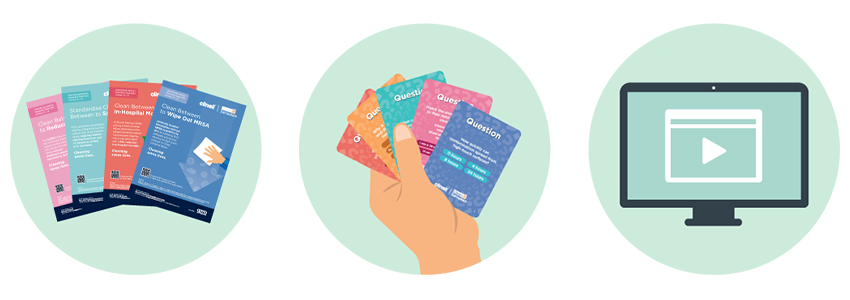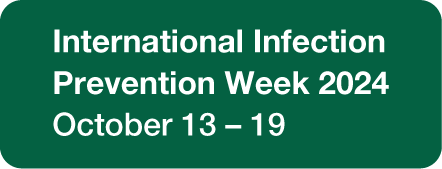Posted
3rd October 2024
Research
Healthcare-associated infections (HAIs) are a significant concern for healthcare facilities worldwide, contributing to patient morbidity, extended hospital stays, and increased healthcare costs. As we approach International Infection Prevention Week (IIPW) 2024, let’s focus on strategies to effectively reduce the incidence of HAIs. One of the most impactful, yet often overlooked, strategies is environmental cleaning and disinfection.
The Power of Enhanced Cleaning: Insights from the CLEEN Study
Recent research underscores the critical role cleaning plays in preventing the spread of infections in healthcare settings. The CLEEN study, a landmark randomised control trial at an Australian hospital, found that cleaning shared medical equipment with Clinell Universal Wipes led to a 34.5% reduction in HAIs.1 This significant reduction demonstrates the profound impact of rigorous cleaning protocols on staff and patient safety.
The CLEEN study’s findings call for healthcare facilities to reassess their cleaning. By incorporating enhanced cleaning protocols, audits, staff training, and investment into education, particularly for high-touch surfaces and shared equipment, healthcare teams can dramatically reduce the risk of HAIs.
The Real-World Impact of Cleaning Protocols
The effectiveness of improved cleaning is not just theoretical. It is demonstrated in real-world cases where proactive infection prevention measures have significantly reduced infection rates. For example, University Hospital Birmingham achieved a 55% reduction in MRSA acquisitions when adopting a 2-in-1 cleaning routine with Clinell Universal Wipes. This success illustrates how routine, simple cleaning practices can have a profound impact on reducing the transmission of stubborn infections like MRSA.2
At Shamir Medical Center, installing Clinell Universal Wipe dispensers at patients’ bedsides allowed for more frequent and effective cleaning. This change led to a 20% reduction in in-hospital mortality, highlighting the critical role that accessible and consistent cleaning resources play in protecting patients and saving lives.3
In another case, NHS Lanarkshire standardised cleaning frequently touched surfaces, reducing mattress cleaning times from over 10 minutes to as little as 6-10 minutes using Clinell Universal Wipes. This efficiency not only saves time but also enhances overall infection prevention efforts.4
Streamlining Infection Prevention
- IPC Educational & Protocol Posters: Download these posters and share clear, consistent cleaning guidelines for all staff to embed best practice into daily routines and improve IPC.
- Engaging and Training Staff: The Clean Between Playing Cards make IPC training engaging and fun, ensuring all team members are aligned in reinforcing best practice.
- Learn from the Expert: Join IPC expert Professor Martin Kiernan on 15 October 2024 as he shares strategies for enhancing compliance and reducing HAIs in the webinar ‘Moving the Needle on IPC Excellence: Strategies for Influence and Compliance.’

Access the resources and register for the webinar:
The fight against HAIs is ongoing, but with the right tools and strategies, healthcare facilities can significantly reduce these infections. Strengthened cleaning protocols, supported by educational resources and engaging training tools, are essential components of a comprehensive infection prevention strategy. As IIPW 2024 approaches, healthcare teams are encouraged to leverage these resources and commit to rigorous cleaning practices that protect patients, residents and staff and save lives.
Clean between to move the needle to reduce HAIs.
Cleaning saves lives.


1. Browne, K., White, N. M., Russo, P. L., Cheng, A. C., Stewardson, A. J., Matterson, G., Tehan, P. E., Graham, K., Amin, M., Northcote, M., Kiernan, M., King, J., Brain, D., & Mitchell, B. G. (2024). Investigating the effect of enhanced cleaning and disinfection of shared medical equipment on health-care-associated infections in Australia (CLEEN): A stepped-wedge, cluster randomised, controlled trial. The Lancet Infectious Diseases. Advance online publication. https://www.sciencedirect.com/science/article/abs/pii/S1473309924003992
2. Garvey, M. I., Wilkinson, M. A. C., Bradley, C. W., Holden, K. L., & Holden, E. (2018). Wiping out MRSA: Effect of introducing a universal disinfection wipe in a large UK teaching hospital. Antimicrobial Resistance & Infection Control, 7(1), 155. https://aricjournal.biomedcentral.com/articles/10.1186/s13756-018-0445-7
3. Dadon, M., Chedid, K., Martin, E. T., Shaul, I., Greiver, O., Katz, I., Saadon, H., Alfaro, M., Hod, L., Shorbaje, A., Braslavsky-Siag, A., Moscovici, S., Kaye, K. S., & Marchaim, D. (2023). The impact of bedside wipes in multi-patient rooms: A prospective, crossover trial evaluating infections and survival. Journal of Hospital Infection, 134, 50-56. https://pubmed.ncbi.nlm.nih.gov/36754289
4. Shepherd, E., Leitch, A., & Curran, E. (2020). A quality improvement project to standardise decontamination procedures in a single NHS board in Scotland. Journal of Infection Prevention, 21(6), 241-246. https://pubmed.ncbi.nlm.nih.gov/33403006/
SHARE THIS ARTICLE
Tags
Latest News
Advancing Continence Care with Clinell Contiplan: Expanded Indications, Pathways and Proven Outcomes
This World Continence Week, Clinell Contiplan 3-in-1 Cream Cloths introduce…
Celebrating 20 Years of GAMA Healthcare: Our Story
This month, GAMA Healthcare celebrates 20 years of helping prevent…
Norovirus and gastroenteritis outbreaks, the party ‘pooper’ you don’t want invited!
Recently, on 11 October 2024, NSW Health issued a health…
Clean Between to Reduce Healthcare-Associated Infections
Healthcare-associated infections (HAIs) are a significant concern for healthcare facilities…



